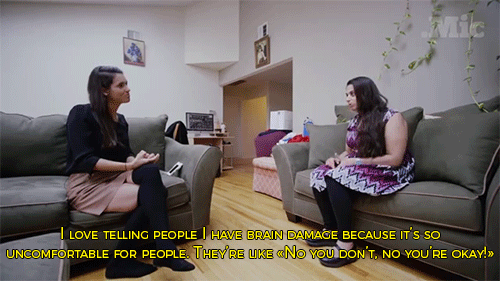 |
| Maysoon Zayid sitting on a couch talking to a reporter. Text reads, "I love telling people I have brain damage because it's so uncomfortable for people. They're like, 'No you don't! You're okay!'" |
This past October, I attended my very first Oregon Library Association Children’s Services Division Workshop. It was a wonderful day full of meeting new people (I don’t think there’s been a single day since July I haven’t met someone new!), sharing great ideas, and problem-solving.
The day ended with a share-out of all the ideas brainstormed for the 2016 CSLP theme, “On Your Mark, Get Set, Read!” I was the last volunteer to read off a list. I had not yet met everyone in the room, and I had spent most of the day, as I call it, “passing.” The unsaid words that are implied after passing, here, are, “as something other than a disability killjoy.”
Never minding the ableist voice in my head that still talks about things like “blowing my cover”, and how no one really wants to hear about inclusiveness YET AGAIN, I shared the following:
“I just wanted to add, as a physically disabled librarian who was once a physically disabled child, to please make sure that your fitness-oriented offerings are marketed and presented as ‘All abilities invited.’”
My candor was well-received that day, and I wanted to make sure I shared more about this idea and what it means here, while you may still be working out your SRP plans.
What does “All Abilities Invited” Look Like?
The first thing you can do is somehow communicate this on your flyers and promotional materials. Saying it plainly like this could help dispel fear in a child or parent that they would have a negative experience.
If you’re unsure about/don’t have the support for/are interested in other ways children in your community to feel more engaged in programming surrounding this admittedly exclusive-sounding theme, here are a few considerations I’ve made based on my experience with disability. This is not an exhaustive list and does not represent the experiences of all People with Disabilities.
Caregivers attending programs: Is your natural reaction to separate school-age children from their caregivers during programs? This may be something you want to reconsider in order for more children to feel welcome (Note: I understand the whole type-A parent thing, but isolating some children to solve a perceived problem for kids who are already there is not my favorite way to go about stuff). Besides the shy kids and others who may need their caregivers to feel safe and engage with the program, some children can function at a high level on their own-- depending on the task. Staying mum about whether a caregiver is present at a program can help children with disabilities succeed in your program.
Races and other public performances: Rethink races so they are not competitive, and that each child’s performance does not depend on another. Any child, not just those with disabilities, could feel anxious rather than excited at the prospect of their contribution affecting the group. What could a fitness-oriented game with no races and a ton of team work look like?
Complete all the stations and win: This is a popular choice for programming and certainly one I’ve done my fair share of. A way to make this more inclusive is, rather than “complete all”, have children complete three out of five. That way, they can pick and choose which ones they are most comfortable with. Also, your definition of completion could be “try this station.” When in doubt, non-committal works (dibs on this as an official slogan).
Have a few different ways to interact with the program: Trust kids and their caregivers to know what their abilities are, and give them a few differentiated options. You will MOST LIKELY not push a child to overcome something they never thought they’d be able to (regardless of the rhetoric surrounding disabilities)but asserting that a child can do something they said that they cannot will MOST LIKELY result in that child not feeling trustworthy in your program and not coming back.

No comments:
Post a Comment